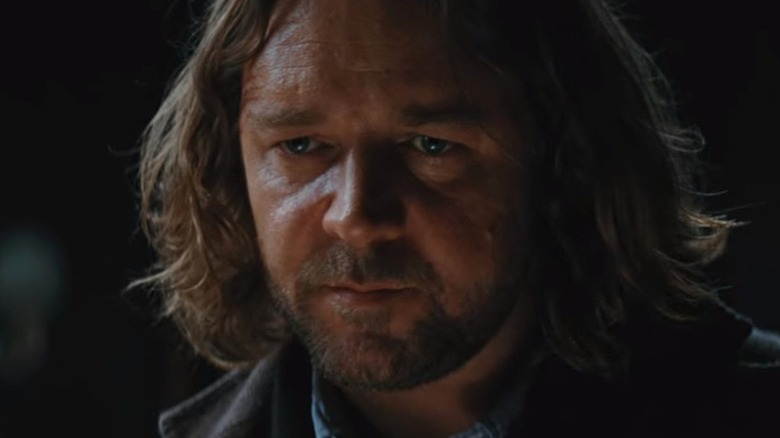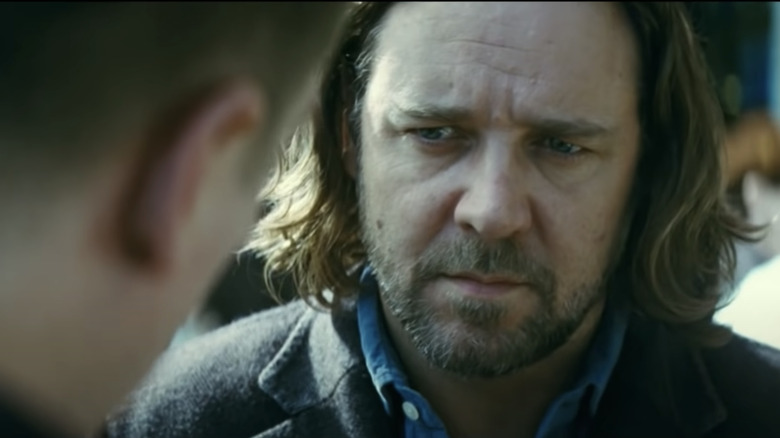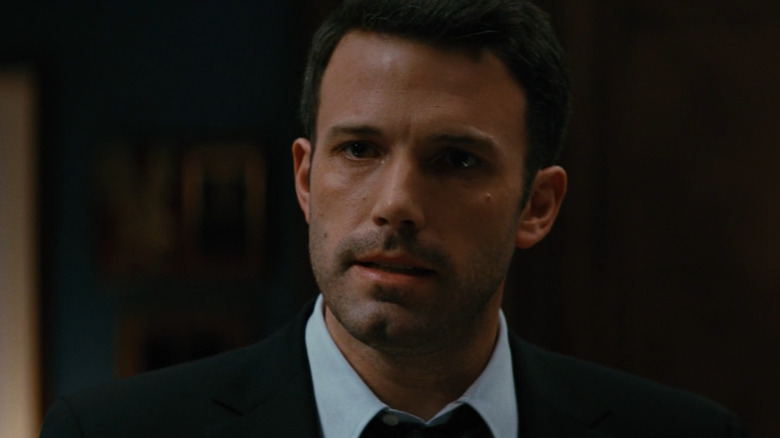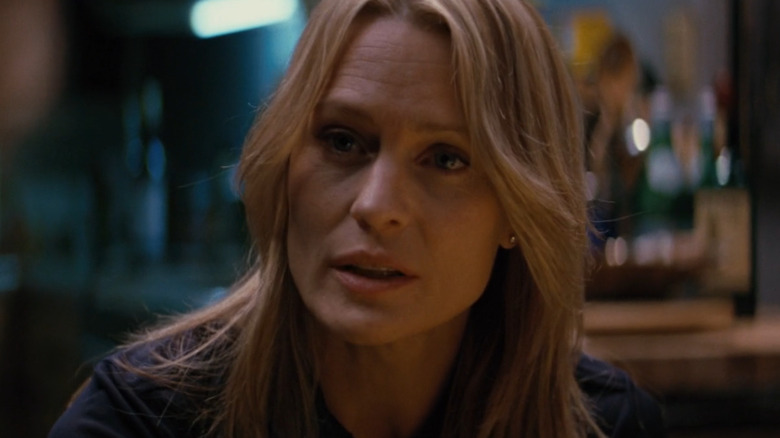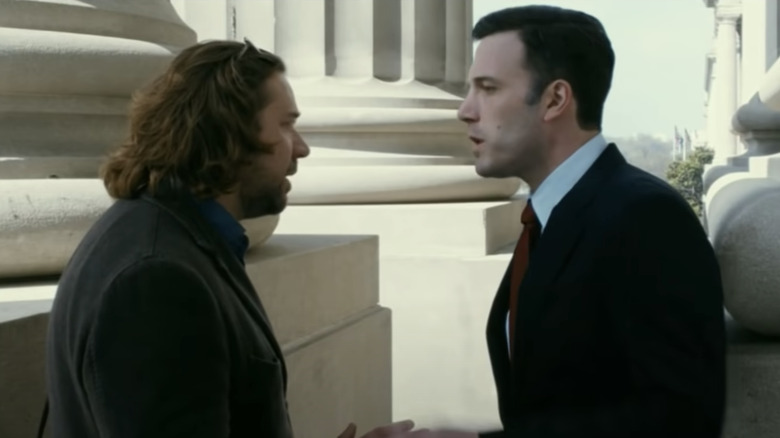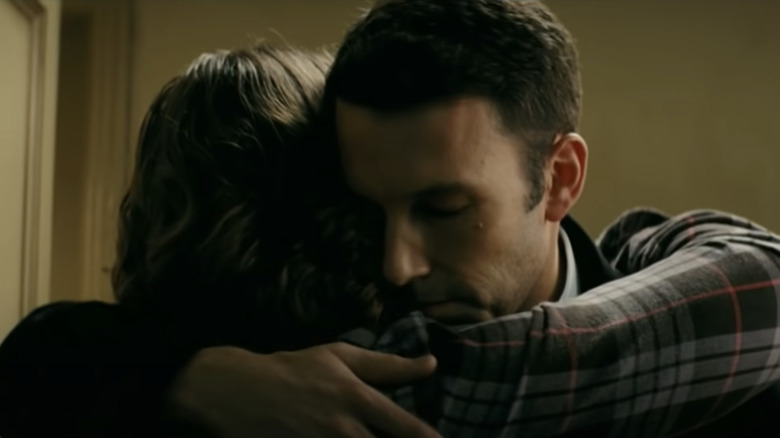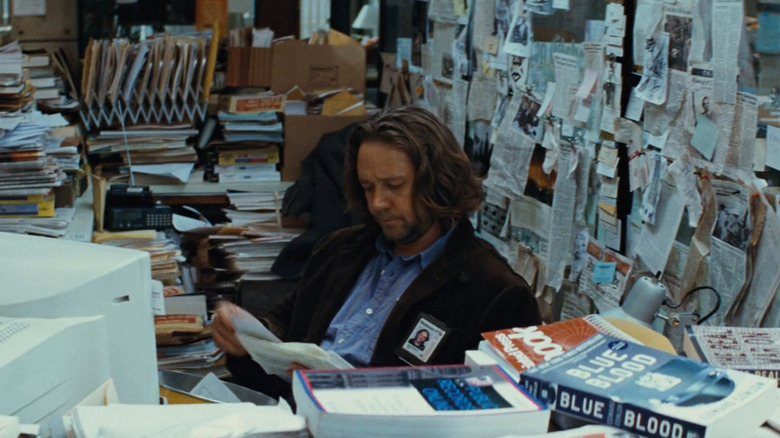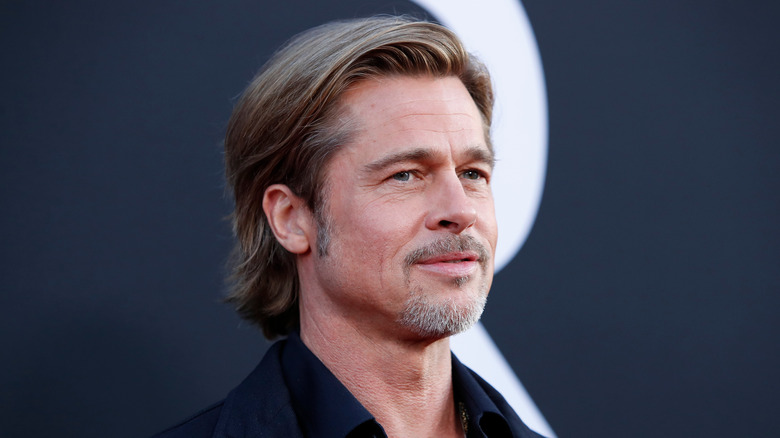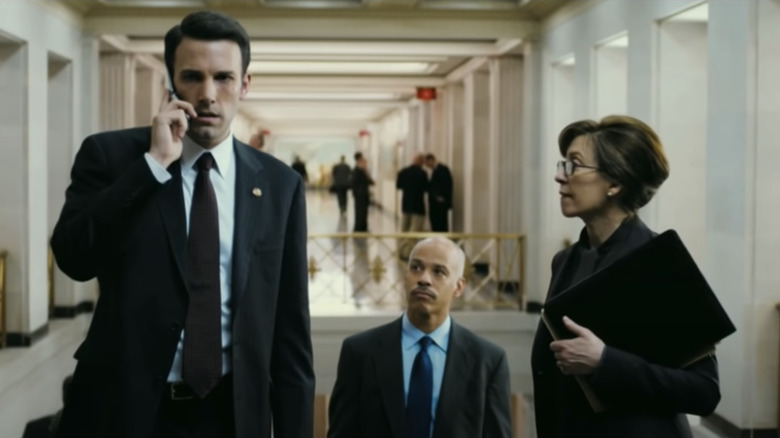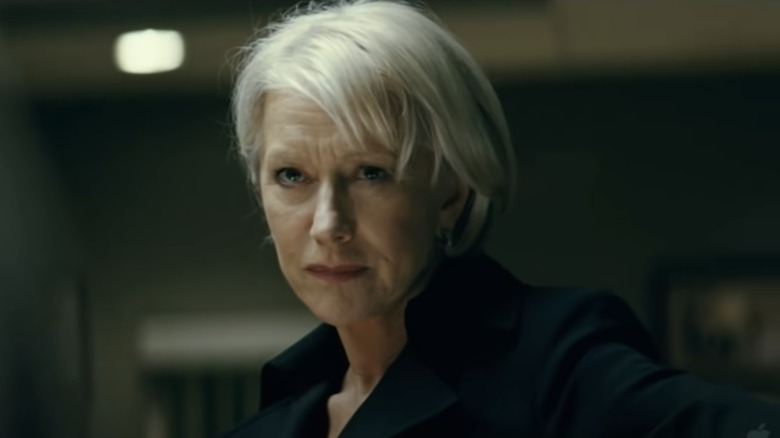The Ending Of State Of Play Explained
There's always been a certain romance in the great newspaper films, and director Kevin Macdonald created a modern entry with his 2009 film "State of Play." With a heaping dose of political thriller thrown in, the movie is reminiscent of classics like "All the Presidents Men." "State of Play" features an ensemble cast of A-list actors, including Rachel McAdams, Russell Crowe, Ben Affleck, Helen Mirren, Jeff Daniels, Robin Wright, and Jason Bateman. There are even some surprising faces for viewers today. Viola Davis plays a grumpy medical examiner, David Harbour is a dangerous mercenary, and Brennan Brown portrays a morally ambiguous political PR manager.
What happens in the film? Well, it's complicated, with multiple twists and turns and lots of big reveals. Two journalists (Crowe and McAdams) stumble on a conspiracy involving a congressman and a private corporate security firm. "State of Play" is based on a 2003 BBC TV series of the same name, which starred a young James McAvoy and Bill Nighy, though the plot differs between the two. The original series was a critical success, leading to, of course, a Hollywood remake. While the film was similarly well-reviewed, it underperformed at the box office, and sadly, this excellent, star-studded film has largely faded since.
Today, this remake would be a high-budget prestige drama limited series — potentially a better choice for the plot given how much happens. Here's everything you need to know about the ending of "State of Play."
The old-school reporter
The experienced, relentless, truth-searching journalist in "State of Play" is Cal McAffrey, played by Russell Crowe. Cal works for The Washington Globe (a clear stand-in for The Washington Post), where he covers the crime beat, cleverly extracting information about a recent shooting from hesitant detectives.
The audience learns that Cal has been friends with political darling congressman Stephen Collins (Ben Affleck) since college. Stephen's affair with a young staffer named Sonia (Maria Thayer) brings him to Cal's door when she dies suddenly. As an experienced newsman, Cal advises Stephen to get in front of the story, and Stephen reveals that he doesn't think Sonia's death was an accident. Naturally, Cal starts investigating, teaming up with blogger Della (Rachel McAdams) to help his friend.
One of the first twists of the film is that Cal had an affair of his own with Stephen's long-suffering wife, Anne (Robin Wright). Cal's guilt over this pushes him to help his friend, blinding him to Stephen's lies. Cal's editor (Helen Mirren) even mentions his odd loyalty to his college buddy, pointing out that Cal has pushed positive articles about the congressman for years. Della is also concerned, believing that Cal's friendship with the congressman puts their story at risk, and in the end, she's right — Stephen is (indirectly) responsible for the death of Sonia.
It's a bittersweet ending: Cal gets his story but loses his oldest friend, though he gains a new one in his working relationship with Della. The final image is Cal giving Della credit for her work, listing her name first in the story.
The newspaper rookie
Della Frye is the ambitious young Capital Hill blogger at The Washington Globe. Young and inexperienced though she is, "She's hungry, she's cheap, and she churns out copy every hour," editor Cameron Lynne tells Cal early on. Cal is rude to Della on their first meeting, refusing to hand over any details about his friend Stephen. Later, he complains to his editor, "I use a 16-year-old computer; she's been here 15 minutes and could launch a Russian satellite with the gear she's got." Despite Cal's jealousy over Della's mid-2000s computer setup (she's got a flat-screen monitor, and he's still using MS-DOS, to be fair), the two eventually join up to investigate Sonia's death and PointCorp's possible involvement.
Della and Cal manage to cobble together a working relationship, with Della acting as the moral voice of the pair. It's Della who reminds Cal that three people have died so far and tries to push the paper to hand over evidence to the police. Later on, when Cal endangers the story's credibility by allowing Stephen to see the video testimony of their witness, Della's also there, pointing out the damage he's doing. On the flip side, Cal stands up for Della, encouraging her to "get loud" and fight for her right to be on the story after their editor considers giving it to another reporter. Their developing friendship and mutual respect is one of the best parts of the story, allowing the pair to grow into a healthy example of mentorship.
The good ol' boys
The character of Stephen Collins, a sincere (if privileged) young congressman, is the kind of role that Ben Affleck has always excelled at playing. There's something darkly all-American about Collins, with the clean-cut good looks, tears over the death of his staffer, and burgeoning political career. Affleck pulls off the upright congressman, making him appear sympathetic and down to Earth – until we start learning his secrets.
There's the affair with Sonia, his manipulation of Cal, and later on, the knowledge that he had an old military buddy stalk his mistress after he became suspicious of her. In fairness, Sonia was spying on Stephen for the evil PointCorp, but his actions are ultimately what lead to her death. To make things more complicated, Cal and Stephen's friendship is fuelled by resentment and the unhealthy love triangle between the two and Stephen's wife, Anne. We learn that Stephen knows about Anne and Cal's affair, and he uses it to exploit Cal.
In the end, Stephen finally admits to Cal that he was indirectly responsible for Sonia's death. The golden-boy politician seems upstanding and principled as he fights against PointCorp, and he's clearly convinced of his own morality. Even after the affair and Sonia's death, Stephen still feels that his work fighting against corporate evil outweighs any personal failings he might have. But Cal can't agree with Stephen's justifications for his actions, and, in the end, the congressman is arrested.
The politician's supportive wife
While Stephen Collins is off trying to save the world from the privatization of American domestic intelligence (and instigating the death of his mistress by having her stalked), his wife Anne is being harassed by the media. Robin Wright famously portrayed another wife of a politician later in her career in "House of Cards." Sadly, the character of Anne Collins doesn't have the arc or depth of Claire Underwood, through no fault of Wright or her excellent acting.
When the audience meets Anne, she's just learned of her husband's affair via lurid media speculation. Stephen tries to call his wife, and she glares at the TV and chucks her still-ringing phone into a desk drawer. Later, she calls Cal, showing how close their friendship is and describing her distress at being publicly humiliated, and the two agree to meet for a drink. Through their subsequent encounters, the audience realizes two things: First, that the two have had an affair, and second, that Anne wants to leave Stephen and take up with Cal. Cal scoffs at both points, and Anne stays with Stephen, supporting him at the newspaper offices when he goes on the record. Last we see of her, she's ensconced in the back of a private car, waiting on Stephen to return from his office. Of course, he never comes.
Sadly, Anne's ending feels like a disservice to her character. Not only is she shown without much personality, but she's desperate, flinging herself from Stephen back into the arms of her old lover. Anne isn't given any agency or resolution. Frankly, the ending shortchanges her.
Fanaticism plays a significant role
Patriotism and its nasty cousin, fanaticism, are central themes in "State of Play." One of the key players in the film is PointCorp — a fictional private security firm with several defense contracts with the United States government, including mercenary and intelligence operations, mainly staffed by ex-military. Throughout the film, PointCorp is investigated by Stephen Collins' congressional committee. Stephen tells Cal that he believes PointCorp is trying to dominate domestic American security, with defense contracts worth almost $40 billion. Is PointCorp behind the death of Sonia? At first, all evidence points back toward the corporation, particularly when Cal realizes that an assassin with ties to the company had pictures of her in his briefcase.
While there are obvious similarities between the fictional PointCorp and the real-life 2004 Blackwater scandal, the assassin in the film doesn't turn out to be a tool of corporate America; rather, he's a pro-military fanatic who owes Stephen a favor. Bingham, Cal is told, is just a guy who couldn't let go of his military life. Stephen manipulates the unstable man into trailing Sonia, and in a rage at her supposed betrayal of the USA (in Bingham's mind), he kills her. "He was more upset about what she was doing than I was," Stephen says. He tries to justify his actions by implying that Sonia's death was just a sad accident, rather than the result of deliberately manipulating a radical.
Tension between old friends
Stephen, Cal, and Anne clearly have a long-standing, if toxic, friendship in "State of Play." These old friends have a lifetime of secrets, in-jokes, and a few betrayals that string them together. Of course, a hefty dose of guilt also informs their dynamic, acting as a catalyst for specific events in the film. Cal's affair with Anne pushes him toward an unwavering support of Stephen, which leads him to a dangerous place.
This tension between Stephen and Cal, this dancing around their separate but connected shame, almost has Cal derail his own story. "Oh, Cal, if there's any corruption here, it's coming from you," his editor tells him at one point. "You've injected yourself into this story right from the beginning, and we all know why." The common blindspots in old relationships are explored throughout the film. cal refuses to see that Stephen is manipulating him, but the manipulation goes both ways. Similarly, Stephen saved Robert Bingham's life when he was younger, placing the unstable ex-military man in Stephen's debt, which the congressman exploits for his own ends.
The quid pro quo, "good ol' boys" relationships of the political world also play a major role in "State of Play," as veteran politician George Fergus (Jeff Daniels) attempts to control Stephen and stop his crusade against PointCorp. Only when Cal lets go of his toxic friendship with Stephen can we see any lasting redemption for his character.
The importance of real journalism
"It's laughable, your sense of your own self-worth," Stephen slings at Cal at the end of "State of Play." "Why is that? Because no one reads the papers anymore?" he responds, zeroing in on one of the film's central themes. "In the middle of all this gossip and speculation that permeates people's lives, I still think they know the difference between real news and b******t, and they're glad that someone cares enough to get things on the record and print the truth." It's a flaming invocation about the importance of a free press, as the whole movie is.
Cal's speech feels particularly relevant in today's world, and director Kevin Macdonald was concerned at the time about the growing business of online news and the decline of print journalism. In an interview with RTE, Macdonald said, "In order to cut costs, they have to make their journalists more efficient, journalists are having to spend less time on a story, less time to research and less time to go wrong. In the old days they could spend days and go 'Oh, there's no story here' [sic] now you have to find a story and that dictates a certain type of journalism."
Cal mimics many fears that journalists at the time had about the proliferation of online news, many of which have been proven valid. As the credits roll, the audience watches The Washington Globe go to print, the old printing machines feeling like a holdover from an earlier time. This image was deliberate, Macdonald told RTE: "If you look at the end of 'State of Play' it looks like Victorian technology, so lumbering and unreliable."
A starring scandal to start
Russell Crowe plays the role of Cal in "State of Play," but that wasn't the original casting. Instead, Brad Pitt was initially meant to play the part. Pitt actually spearheaded the project, overseeing the script's development and initial casting. It was even his idea to have Kevin Macdonald direct. However, there were early problems between the two, and right before production was set to begin, Pitt pulled out. "He wanted to do it in six months and he didn't want to use the script -– and I did," Macdonald shared in an interview with The Scotsman.
And so, a week before shooting, Macdonald was left with a cast, a crew, costumes, a massive set, and no leading man. How did the director feel about the situation? "It's amicable," he told The Guardian in regard to his relationship with Pitt. "I have no bad feelings towards him except that it was at the very last minute and that was tough on me and the studio." According to Macdonald, the film nearly collapsed before it even got started. "It was a fiasco. A week before shooting, I was left with this $2m set of a newspaper room; it was dressed and ready to go. I was thinking it was all going to be knocked down unless I could find another actor."
What to do? Well, the studio gave him a few weeks to find a replacement – one with equal star power.
A change in leading men
In 2000, Russell Crowe starred in a little movie called "Gladiator," which made him a household name, garnered him an Oscar and a BAFTA nomination for his role, and earned a cool $460 million worldwide. Suffice it to say, Crowe was exactly what the studio was looking for as a replacement for Brad Pitt on "State of Mind," though he and Kevin Macdonald would have a few issues of their own on set.
After reading the script, Crowe invited Macdonald to Australia to discuss the film. "I didn't know if he would agree," Macdonald told The Scotsman. "It was a difficult position for him, as an actor of his caliber, because he's stepping into a dead man's shoes. It was big deal in Hollywood when Brad pulled out. There were threats of legal suits." Despite the scandal, Crowe agreed to star in the film, but it wasn't all smooth sailing. According to Macdonald, "It was difficult at times, as Russell is used to filming with Ridley Scott, who will have five cameras on a scene and run it through maybe only three times." Macdonald had a different filming style — one that irritated Crowe a bit. "I like a lot of takes, play around and change things," the director told The Scotsman.
Despite its shaky start, "State of Play" managed to pull off a complex storyline with its talented cast.
The director had some clear influences
From the start, Kevin Macdonald knew he wanted to make some changes from the original BBC version of "State of Play." Not only would Bill Nighy's role change gender and go to Helen Mirren, but Macdonald wanted to create a more realistic journalistic backdrop for the film. "The original State of Play wasn't set in any recognizably real journalistic world," Macdonald told The Guardian. "It's not what really interested Paul Abbott; in fact, he'll tell you proudly that he didn't even do any research with journalists, whereas we spent a lot of time getting advice from the Washington Post."
Macdonald's affection for classic newspaper movies was also a massive inspiration for the film. "I thought the crisis in newspapers was something to be explored," he told The Guardian. "I love All the President's Men and, in fact, all films about journalism. I thought we could make the last film about newspapers before they die." The Washington Globe almost feels like an extra character in the film — a massive entity controlling the lives of journalists, editors, advertisers, and the politicians it reports to.
